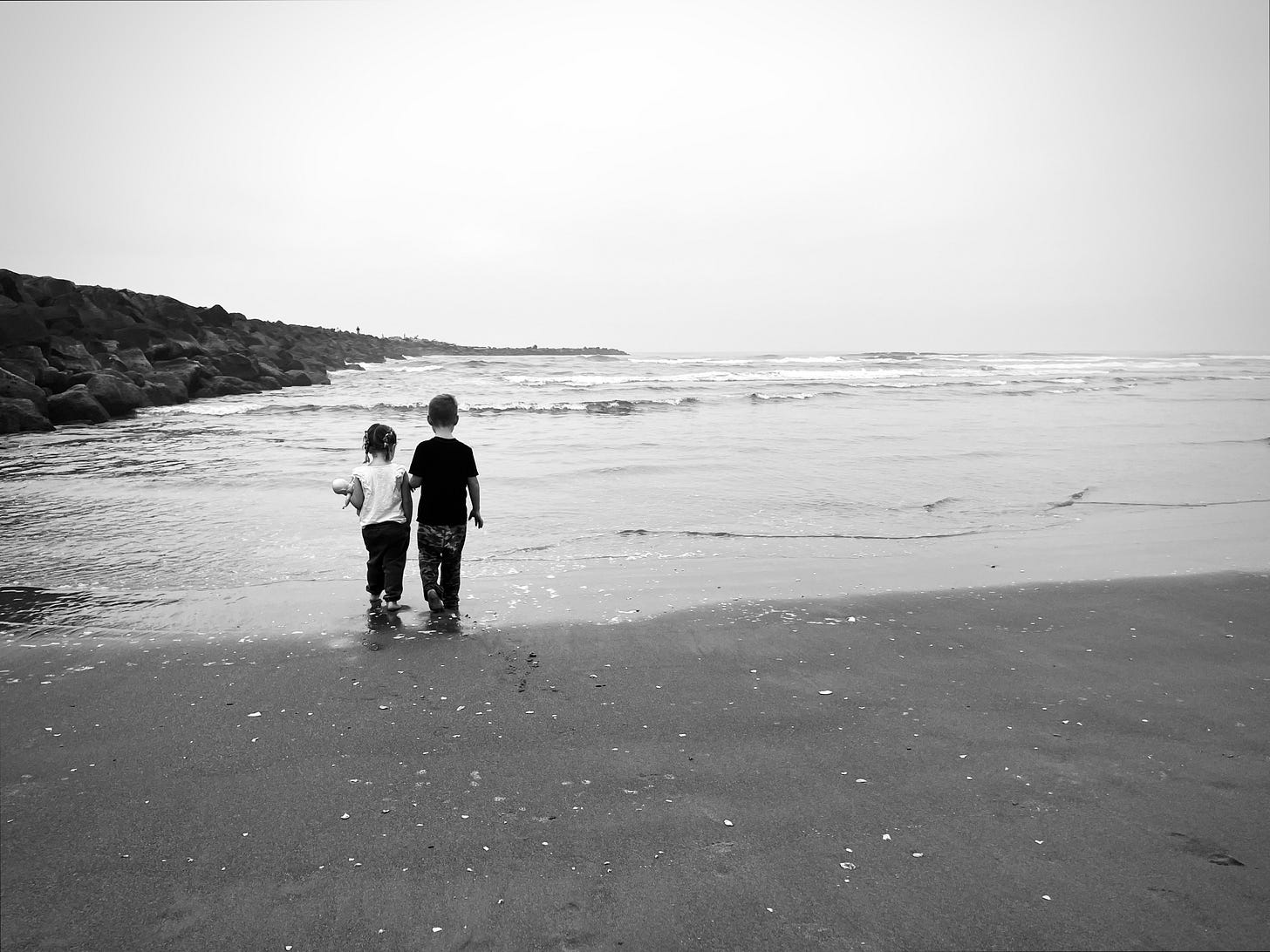“We aren’t kids anymore. We are wild humans.”
The first time my kids played a game they call “wild humans” was at the North Jetty, a beach in Florence, Oregon. They stripped off all their clothes, save their skivvies, and ran around with collected sticks and feathers, calling a driftwood cave their home. They made up their own language and gesticulated frantically, tapping into some primal urge to be wild.
It reminded me of my days as a child on our little farm in Crabtree. Building forts were the trees met the blackberry vines, the sweet berry juice dripping down my chin and my chest. Pink rubber boots splashing through the pond chasing sheep and running from bees and nutria. Hours in the sunshine collecting various flowers (usually weeds, let’s be honest) to turn into potions and other concoctions. Hiding under the blue spruce collecting woolly bears in an old coffee can. Convening in the loft of the wooden barn for a meeting of a secret club, which only my sister and I were members. Jumping for hours on a net-less trampoline. Reading sticky library books while perched in our jasmine tree. Sitting on the front porch steps, with a tiny notebook in hand writing poetry about nature or channeling Harriet the Spy writing observations about my siblings, my fingernails tracing the lines of the porch boards.
I was lucky enough to have a wild childhood.
Piaget wrote, “Play is the work of childhood.”
The great prophet Mr. Rogers said, “Play is serious learning.”
After several hours of playing wild humans, Declan and Maeve didn’t want to load back up into our minivan where their tablets full of simulated soccer games and PBS Kids shows awaited them. They just wanted to chase seagulls and bury their bodies in sand and splash in the saltwater. They collected shells to decorate their open air home and the tides continued fluctuating as the sun lowered in the sky.
I don’t know where they get their of idea of what it means to be fully and completely human—free of whatever is inhibiting us from living entirely in our wildness.
We have been enjoying watching the parade of planets this month. In fact, the alignment of six planets will peak this week. Most Oregon Januarys are overcast and dreary, limiting pour view of the night sky. But the last couple of weeks we have had sunny (though still cold) days and crispy clear nights, giving us a full view of the planets in the evening sky. Mars in the east is easiest to find with the naked eye, thanks to its reddish-orange hue, like a burning ember floating away from a burning fire. Then follow up and west and you’ll see Jupiter shining proudly. Further west are Saturn and Venus stacked brightly like one super planet. If you aren’t sure if you’re looking at a star or a planet, know that planets don’t twinkle. Their light is steady and constant. Neptune and Uranus are there too, but harder to find without a telescope.
Watching the planets helps us realize how incredibly small we are, expanding our sense of wonder. We are on Earth for such a short time, which means every second is valuable. The cosmos are immeasurable, and yet here we are in this moment. With these humans. Under these celestial bodies.
Since the beginning of humanity, people have studied the night sky—tracking time and way-finding across oceans and planting and centering religious rituals around the movement of constellations. Watching the planets make me feel like a wild human.
There is a shift right now away from social media. I think we are realizing that true connection doesn’t happen over a screen, but over a meal or over a bonfire or under the stars. If you’ve ever wandered through a cathedral, you know the best art is always above you. It is hard to be wild when our gaze is wandering down to a screen instead of looking up.
Let us be wild.
Let us be human.
Let us be present.
Let us look up.
Perhaps it is in these moments of wildness, whether it's the uninhibited delight of my children at the coast or the awe-inspiring dance of the planets, that we connect with the something fundamental about being. We remember that beneath all our worries and daily plans and laundry and dishes and emails and bath times and tasks, that we all really just yearn to be free to connect with the natural world and each other. Let us be, simply, human.




